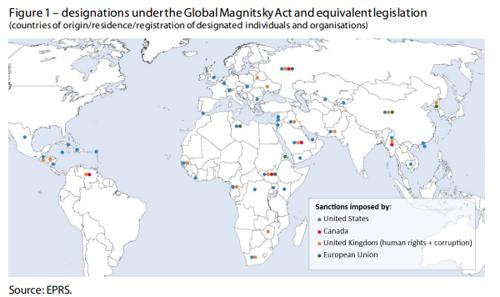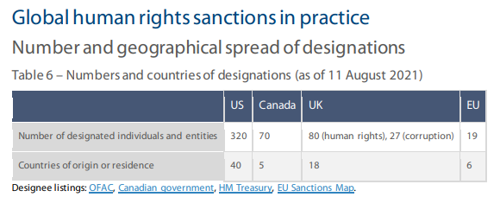
The EU has its own Magnitsky [human rights] sanctions, like those in the US, Canada and UK
03/10/2024
The European Union has its own version of the Magnitsky [human rights] sanctions, like those in the US, Canada, UK
- The European Union has its own version of the Magnitsky sanctions, like those in the UK and US. These are known as the
- EU Global Human Rights Sanctions Regime.
- Adopted in December 2020, this regime allows the EU to target individuals and entities responsible for serious human rights violations and abuses worldwide.
- Just like the US Global Magnitsky Act and the UK's Global Human Rights and Anti-Corruption Regulations, the EU's sanctions can be applied to perpetrators regardless of their location.
- However, there are some differences in terms of the specific criteria and the scope of offenses covered.
Global human rights sanctions - Mapping Magnitsky laws: The US, Canada, UK and EU approach


Images sourced from - https://www.europarl.europa.eu/RegData/etudes/BRIE/2021/698791/EPRS_BRI(2021)698791_EN.pdf
Background to the Magnitsky [human rights] sanctions
- Human rights sanctions are nothing new, but the death in 2009 of Russian whistle-blower Sergei Magnitsky in detention resulted in calls for more vigorous action to counter continuing abuses in many countries.
- Adopted by the US in 2016, the Global Magnitsky Act [the US Global Magnitsky Act] was the first of a new generation of human rights sanctions programmes, which, in contrast to traditional sanctions targeted at individual countries, can be flexibly applied to perpetrators from all over the world, regardless of their geographical location.
- the US Global Magnitsky Act, was followed by:
- Canada's Sergei Magnitsky Law,
- The UK's Global Human Rights and Anti-Corruption Regulations, and
- The EU's restrictive measures against serious human rights violations and abuses, the most recent of the four to be adopted.
- All of these are inspired by the ambition to tackle serious human rights crimes from around the world, but there are also significant differences, for example, in terms of the threshold for human rights offences, the inclusion or not of corruption-related offences, and the role played by parliaments and civil society.
- In terms of practical application, Global Magnitsky is by far the most active of the four programmes for the time being, targeting over 300 individuals and entities from 40 countries.
- Traditional geographical sanctions still predominate in all four jurisdictions; nevertheless, restrictive measures applied under global programmes to Chinese, Russian and Saudi officials highlight the role that such sanctions can play in furthering Western cooperation on human rights.
Learn more.
- The following briefing has been written as part of a collaborative project between the European Parliament's Research Service and Directorate-General for External Policies on mapping best practices in global human rights sanctions regimes.
Source:
- Global human rights sanctions - Mapping Magnitsky laws: The US .... https://www.europarl.europa.eu/thinktank/en/document/EPRS_BRI%282021%29698791.
- https://www.europarl.europa.eu/thinktank/en/document/EPRS_BRI%282021%29698791
The Team
Meet the team of industry experts behind Comsure
Find out moreLatest News
Keep up to date with the very latest news from Comsure
Find out moreGallery
View our latest imagery from our news and work
Find out moreContact
Think we can help you and your business? Chat to us today
Get In TouchNews Disclaimer
As well as owning and publishing Comsure's copyrighted works, Comsure wishes to use the copyright-protected works of others. To do so, Comsure is applying for exemptions in the UK copyright law. There are certain very specific situations where Comsure is permitted to do so without seeking permission from the owner. These exemptions are in the copyright sections of the Copyright, Designs and Patents Act 1988 (as amended)[www.gov.UK/government/publications/copyright-acts-and-related-laws]. Many situations allow for Comsure to apply for exemptions. These include 1] Non-commercial research and private study, 2] Criticism, review and reporting of current events, 3] the copying of works in any medium as long as the use is to illustrate a point. 4] no posting is for commercial purposes [payment]. (for a full list of exemptions, please read here www.gov.uk/guidance/exceptions-to-copyright]. Concerning the exceptions, Comsure will acknowledge the work of the source author by providing a link to the source material. Comsure claims no ownership of non-Comsure content. The non-Comsure articles posted on the Comsure website are deemed important, relevant, and newsworthy to a Comsure audience (e.g. regulated financial services and professional firms [DNFSBs]). Comsure does not wish to take any credit for the publication, and the publication can be read in full in its original form if you click the articles link that always accompanies the news item. Also, Comsure does not seek any payment for highlighting these important articles. If you want any article removed, Comsure will automatically do so on a reasonable request if you email info@comsuregroup.com.


